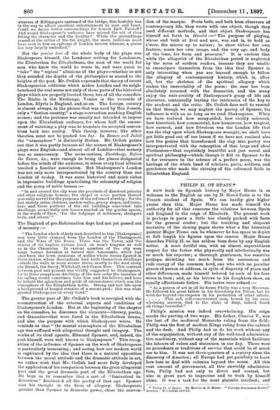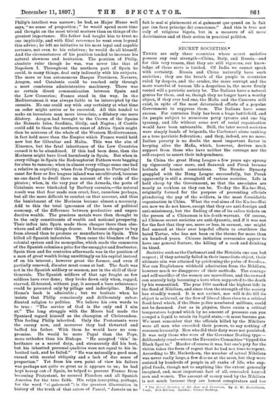PHILIP IL OF SPAIN.*
A NEW book on Spanish history by Major Hume is as welcome to the English as one by M. Morel-Fatio is to the
French student of Spain. We can hardly give higher praise than this. Major Hume has made himself the authority for all that concerns the relations between Spain and England in the reign of Elizabeth. The present work is perhaps in parts a little too closely packed with facts for the general reader ; but the touching and eloquent narrative of the closing pages shows what a fine historical painter Major Hume can be whenever he has space to depict at full length his figures upon the canvas. Major Hume describes Philip IL as has seldom been done by any English writer. A most dutiful son, with an almost superstitious respect for the father who physically and intellectually was so much his superior; a thorough gentleman, too sensitive perhaps, shrinking too much from the coarseness and rude energy of the common herd, one who with no peculiar graces of person or address, in spite of disparity of years and other differences, made himself beloved by each of his four wives in turn; and, as his letters to his daughters show, an equally affectionate father. His tastes were refined :—
" As a patron of art in all its forms Philip was a very Maecenas. He followed his great father in his friendship for Titian, but he went far beyond the emperor in his protection of other artists.
This sad, self-concentrated man, bowed by his over- whelming mission, tied to the stake of duty, indeed loved all things beautiful."
Philip's mission was indeed overwhelming. His reign
marks the parting of two ways. His father, Charles V., was the last of the mediaeval Monarchs ruling from the field ; Philip was the first of modern Kings ruling from the cabinet and the desk. And Philip had to do his work without any of the organisation, without any of the well-tried administra- tive machinery, without any of the materials which facilitate
the labours of rulers and statesmen in our day. There were no precedents or traditions of service that could be of much use to him. It was not three-quarters of a century since the discovery of America ; all Europe had yet painfully to learn
how beat to deal with colonies beyond the ocean. All this vast amount of government, all this unwieldy administra- tion, Philip had not only to direct and control, but also in great part to improvise and to work by himself alone. It was a task for the most gigantic intellect ; and
• Philip II. of Spain. By Martin A. S. Hume. " Foreign Statesmen Series." London Macmillan and Co. Philip's intellect was narrow; he had, as Major Hume well says, " no sense of proportion ; " he would spend more time and thought on the moat trivial matters than on things of the greatest importance. His father had taught him to trust no one implicitly, and with filial reverence be went even beyond this advice ; he left no initiative to his most loyal and capable servants, not even to his relatives ; he would do all himself. And the circumstances of his position tended to increase his natural slowness and hesitation. The position of Philip, absolute ruler though he was, was never like that of Napoleon I. Throughout the northern part of Spain he could, in many things, deal only indirectly with his subjects. The more or less autonomous Basque Provinces, Navarre, Aragon, and Catalonia could be reached only through a most cumbrous administrative machinery. There was no certain direct communication between Spain and the Low Countries; France stood in the way. In the Mediterranean it was always liable to be intercepted by the corsairs. No one could say with any certainty at what time an order might arrive or be executed. All this tended to make an irresolute man more irresolute, a dilatory one more dilatory. Aragon had brought to the Crown of the Spains the Balearic Isles, Sardinia, Sicily, and Naples ; if Castile could add to these the northern coast of Africa Spain might then be mistress of the whole of the Western Mediterranean, in fact hold more than the Empire which France would hold now but for Gibraltar and Malta. This was the aim of Ximenes, but the fatal inheritance of the Low Countries caused it to be abandoned. If this had been done, then the Moriscos might have lived harmlessly in Spain. But when in every village in Spain the Redemptorist Fathers were begging for alms to ransom; when in almost every village some one had a relative in captivity; when from Perpignan to Portugal the coast for four or five leagues inland was uncultivated, because no one dared to dwell there on account of the raids of the pirates ; when, in the very year of the Armada, the ports of Catalonia were blockaded by Barbary corsairs,—the natural result was that fear made men cruel, fear, causeless perhaps, but all the more difficult to combat on that account, and thus the banishment of the Moriscos became almost a necessity. Add to this the total ignorance of the laws of political economy, of the difference between productive and unpro- ductive wealth. The precious metals were then thought to be the only constituents of wealth and national prosperity. Their influx into Spain made them cheaper there than else- where and all other things dearer. It became cheaper to buy from abroad than to produce or manufacture in Spain. This killed all Spanish industries. Then came the blunders of the colonial system and its monopolies, which made the commerce of the Spanish colonies a prize for the smuggler and freebooter. Spain then and for centuries afterwards was in the position of a man of great wealth living unwittingly on his capital instead of on his interest ; however great the former, and even if partially renewed, disaster must come at last. The fault was not in the Spanish soldiery or seamen, nor in the skill of their Generals. The Spanish soldiers of that age fought as few soldiers have ever done ; they broke down only when, ragged, starved, ill-treated, without pay, it seemed a bare subsistence could be procured only by pillage and indiscipline. Major Hume's book is admirable ; but we hesitate when he insists that Philip consciously and deliberately subor- dinated religion to politics. We believe his own words to be true : " The service of God is the only end I aim at." The long struggle with the Moors had made the Spaniard regard himself as the champion of Christendom. This feeling Philip inherited. Only the Protestants were the enemy now, and moreover they had thwarted and baffled his father. With them he would have no com- promise. He would be more Papal than the Pope, more orthodox than his Bishops. "He accepted `this' in- heritance as a sacred duty, and strenuously did his best, but his inherited personal qualities were not equal to his in- herited task, and he failed." " He was naturally a good man, cursed with mental obliquity and a lack of due sense of proportion." Yet from his own point of view his failure was perhaps not quite so great as it appears to us ; he had kept heresy out of Spain, he helped to prevent France from becoming Protestant, be secured Flanders and all Spanish America for the true faith. His reign (excepting, perhaps, for the word " ei gaiement ") is the greatest illustration in history of the truth of that axiom of Pascal, " Jamais on ne
fait le mal si pleinement et si gaiement qua quand on le fait par (tin faux principe de) conscience." And this is true not only of religious bigots, but in a measure of all mere doctrinaires and of their action in practical politics.











































 Previous page
Previous page